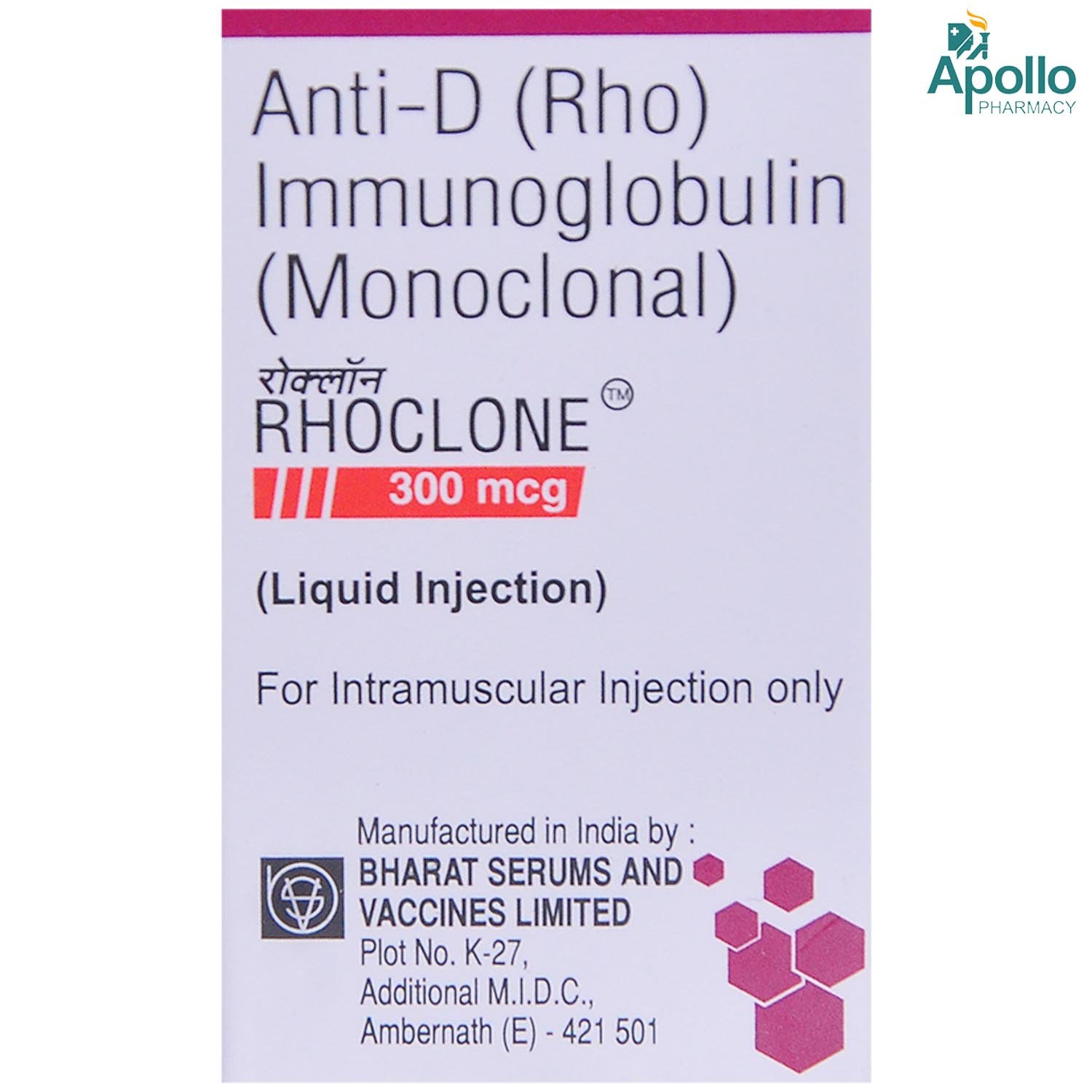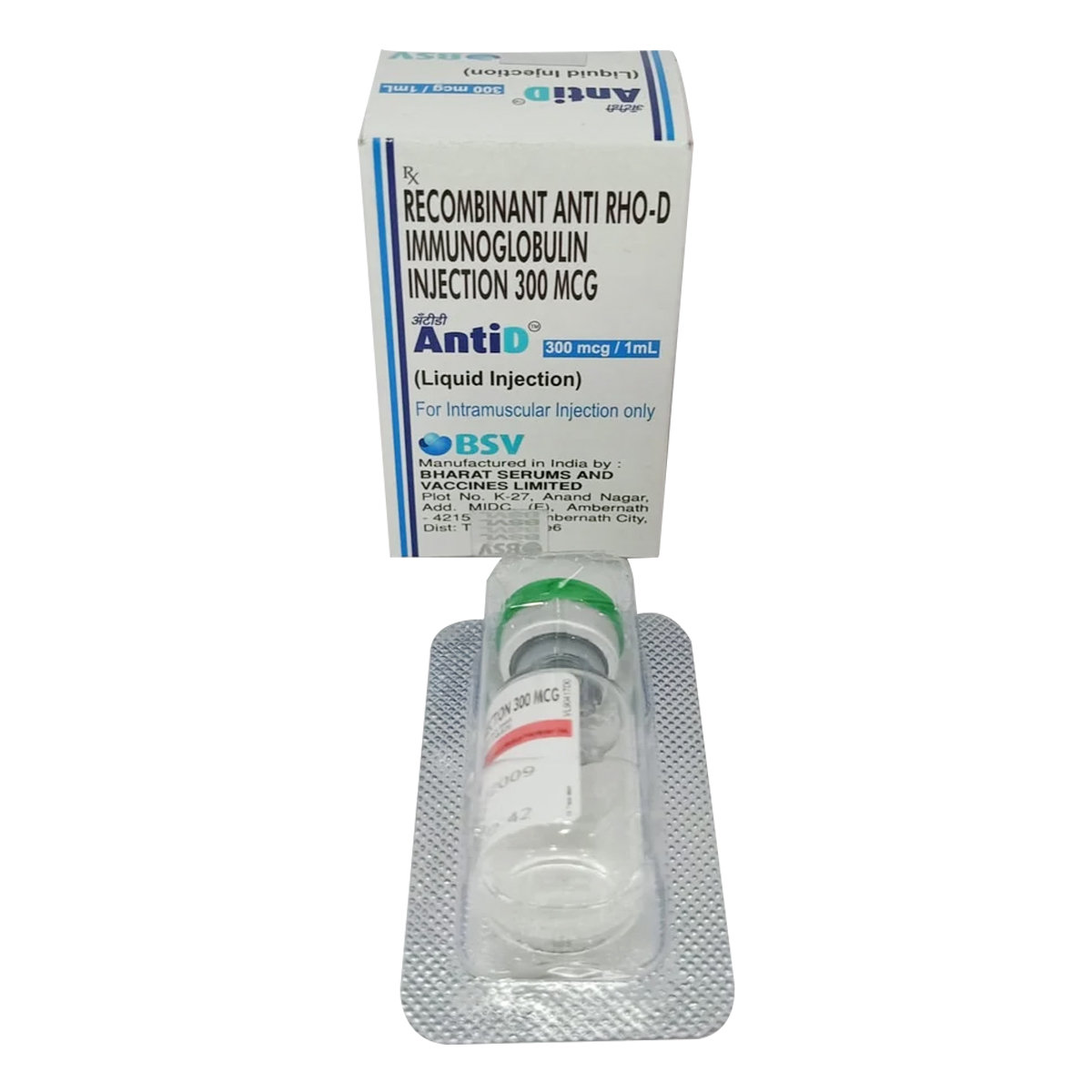- Home
- AntiD 300mcg/ml Injection
AntiD 300mcg/ml Injection Substitute
AntiD 300mcg/ml Injection Substitute
Medicine Composition:
ANTI RH D IMMUNOGLOBULIN-300MCGAll Substitutes & Brand Comparisons
RX
Out of StockRhogam 300 mcg Injection 15 ml
Johnson & Johnson Pvt Ltd
₹2209.8
(₹132.59/ 1ml)
97% CHEAPERRX
Out of StockVinobulin 300mcg Injection
Bharat Serums and Vaccines Ltd
₹2299.5
(₹1034.78/ 1ml)
76% CHEAPERRX
Out of StockKamrho D 300mcg Injection
Synergy Diagnostics Pvt Ltd
₹2580
(₹1161.0/ 1ml)
74% CHEAPERRX
Out of StockRhesuman 300mcg Injection
Cadila Pharmaceuticals Ltd
₹1988
(₹1789.2 per unit)
59% CHEAPERRX
Out of StockRhoclone 300mcg Injection 1's
Bharat Serums and Vaccines Ltd
₹2383
(₹2097.04 per unit)
53% CHEAPERRX
Out of StockMatergam P 300mcg Injection
Zydus Cadila
₹2807.5
(₹2302.15/ 1ml)
48% CHEAPERRX
Anti D 300 MCG / 1ml Injection 1 ml
Bharat Serums and Vaccines Ltd
₹4469
(₹3932.7 per unit)
12% CHEAPERRX
Out of StockWinrho Sdf 300 Mcg Inj
Paviour Pharmaceuticals Pvt Ltd
₹7497
(₹6147.54 per unit)
37% COSTLIER

When Should You Consider Switching from AntiD 300mcg/ml Injection?
Patients may explore substitutes in the following scenarios:
- High monthly cost of AntiD 300mcg/ml Injection
- Non-availability in local pharmacies
- Generic recommendation by a doctor
- Side effects or better tolerability with alternatives
What to Know Before Switching
Before you switch from AntiD 300mcg/ml Injection to another medicine, here are some important points to keep in mind:
Same salt, different brands:
Most substitutes contain the same active ingredient - ANTI RH D IMMUNOGLOBULIN-300MCG, but the fillers, coating, or manufacturing quality may vary slightly.
Consult your doctor first:
Even if the salt is the same, your doctor can confirm if the substitute is right for your condition, dosage, and health history.
Watch out for allergies or reactions:
Some people may react differently to certain brands due to inactive ingredients. If you notice any side effects, inform your doctor immediately.
Price ≠ effectiveness:
A lower-priced substitute doesn't mean it's less effective. Many generic medicines work just as well as branded ones.
Check the dosage form and strength:
Always match the substitute’s strength (e.g., 5mg, 10mg) and form (tablet, capsule, syrup) with what your doctor prescribed.
Uses
Medicinal Benefits
AntiD 300mcg/ml Injection contains 'Anti-D (Rh) immunoglobulin', which is used to prevent rhesus disease. AntiD 300mcg/ml Injection is recommended for use in RhD-negative women who are carrying, just delivered, or have lost an RhD-positive baby. It is also recommended for RhD-negative women carrying RhD-positive babies if the pregnant woman has a severely complicated pregnancy, if the baby's RhD-positive blood passes into the mother's blood circulation, if the doctor needs to perform testing methods to identify fetal deformities, if the doctor is trying to move the baby from outside, or if the mother experiences abdominal trauma (injury to gut or stomach). AntiD 300mcg/ml Injection is also administered during the third trimester of pregnancy if the pregnant woman's blood type is RhD negative. This is called routine antenatal anti-D prophylaxis. AntiD 300mcg/ml Injection is also given to people who had mismatched transfusions (RhD-negative child or adult who have accidentally received RhD-positive blood).
FAQs
The substitutes of AntiD 300mcg/ml Injection contain the same active salt(s) - ANTI RH D IMMUNOGLOBULIN-300MCG. However, they may differ in price, manufacturing quality, and inactive ingredients. Speak to your doctor to find a suitable option.
Switching to a generic substitute medicine in the place of AntiD 300mcg/ml Injection is often possible if it has the same salt, strength, and dosage form. But always check with your doctor before making any changes to your medication.
Generics versions of AntiD 300mcg/ml Injection are typically more affordable because they don’t include the original brand's research, development, and marketing costs. They contain the same active ingredient and are approved for safety and effectiveness.
Most people don’t notice any difference. However, some may react to different fillers or coatings. If you notice any unusual symptoms after switching, consult your doctor.
Make sure the new medicine has the same active salt, strength, dosage form. Always confirm the change with your doctor or pharmacist.
Substitutes of AntiD 300mcg/ml Injection meet the same safety and efficacy standards as AntiD 300mcg/ml Injection, but small differences in absorption or formulation can exist. A doctor can help you choose the right one for your needs.
Yes. Substitutes of AntiD 300mcg/ml Injection may vary in color, size, or shape due to differences in manufacturing and branding, but this does not affect how they work.
Yes, it’s generally safe to switch between multiple substitutes of AntiD 300mcg/ml Injection if they have the same salt and strength. However, always inform your doctor so they can monitor how your body responds.
Yes, many people safely use substitutes of AntiD 300mcg/ml Injection for long-term treatment. Just ensure it’s done under medical supervision.
If your symptoms stay under control or lab results remain stable, the substitute for AntiD 300mcg/ml Injection is likely working well. Regular follow-ups with your doctor are important.
Absolutely. Even with the same salt, small differences can affect how your body responds when switching from AntiD 300mcg/ml Injection to its substitute. Always consult your doctor before switching.
Buy best Immuno Modulators products by
Intas Pharmaceuticals Ltd
Ipca Laboratories Ltd
Panacea Biotec Ltd
Cipla Ltd
Emcure Pharmaceuticals Ltd
Biocon Ltd
Hetero Healthcare Pvt Ltd
RPG Life Sciences Ltd
Reliance Formulation Pvt Ltd
Sun Pharmaceutical Industries Ltd
Bharat Serums and Vaccines Ltd
Novartis India Ltd
Zydus Healthcare Ltd
Overseas Health Care Pvt Ltd
Prevego Healthcare & Research Pvt Ltd
Wallace Pharmaceuticals Pvt Ltd
Zydus Cadila
Alkem Laboratories Ltd
Alembic Pharmaceuticals Ltd
Cadila Healthcare Ltd
Knoll Healthcare Pvt Ltd
La Renon Healthcare Pvt Ltd
Msn Laboratories Pvt Ltd
Abbott India Ltd
Concord Biotech Ltd
EVERVITAL LIFESCIENCES
Mylan Pharmaceuticals Pvt Ltd
Steadfast MediShield Pvt Ltd
Tas Med India Pvt Ltd
Wockhardt Ltd
Anthem Bio Pharma
Hetero Drugs Ltd
Hospimax Healthcare Pvt Ltd
Indiabulls Pharmaceuticals Pvt Ltd
Micro Labs Ltd
Biotest Pharma Gmbh
Brinton Pharmaceuticals Ltd
CONCORD DRUGS LTD
Calren Care Lifesciences Pvt Ltd
Celon Laboratories Pvt Ltd
Cognitus Life Sciences Pvt Ltd
Medgenix Pharma India Pvt Ltd
Mediart Life Sciences Pvt Ltd
Natco Pharma Ltd
Rene Lifescience
Vasu Organics Pvt Ltd
Alniche Life Sciences Pvt Ltd
Ankaa Pharmaceutical
Arcalis India Pharmaceuticals Pvt Ltd
Astellas Pharma India Pvt Ltd
Bharat Sanchar Nigam Ltd
Canixa Life Sciences Pvt Ltd
Care Formulations Lab
Celera Healthcare Pvt Ltd
Concord Laboratories Pvt Ltd
Dr Reddy's Laboratories Ltd
Immune Biotech Pvt Ltd
Lupin Ltd
Oxygen Pharma Care Pvt Ltd
Plasmagen Biosciences Pvt Ltd
Rhumasafe Pharma
Rivan Pharmaceuticals Pvt Ltd
Rockmed Pharma Pvt Ltd
The Madras Pharmaceuticals
Ajanta Pharma Ltd
Akognos Life Science Pvt Ltd
Aubade Healthcare Pvt Ltd
Biogen Idec Biotech India Pvt Ltd
Cadila Pharmaceuticals Ltd
Celera Pharma Pvt Ltd
East West Pharma India Pvt Ltd
Elera Pharma Ltd
Eli Lilly and Company (India) Pvt Ltd
Enactis Healthcare Pvt Ltd
Entero Healthcare Solution Pvt Ltd
Fresenius Kabi India Pvt Ltd
Galcare Pharmaceuticals Pvt Ltd
Getwell Oncology Pvt Ltd
Glasier Wellness Inc
GlaxoSmithKline Pharmaceuticals Ltd
Glenmark Pharmaceuticals Ltd
J B Chemicals & Pharmaceuticals Ltd
Neuten HealthCare
Pfizer Ltd
Renauxe Pharma India Pvt Ltd
Sai Mirra Innopharma Pvt Ltd
Steris Healthcare
Torrent Pharmaceuticals Ltd
United Biotech Pvt Ltd
Virchow Biotech Pvt Ltd
Actus Health Care
Alacris Healthcare Pvt Ltd
Ant Pharmaceuticals Pvt Ltd
Assentus Biogenics Pvt Ltd
Aureate Healthcare
Azista Industries Pvt Ltd
BDH Industries Ltd
BSA Pharma Inc
Bharat Biotech
Bioceutics Inc






